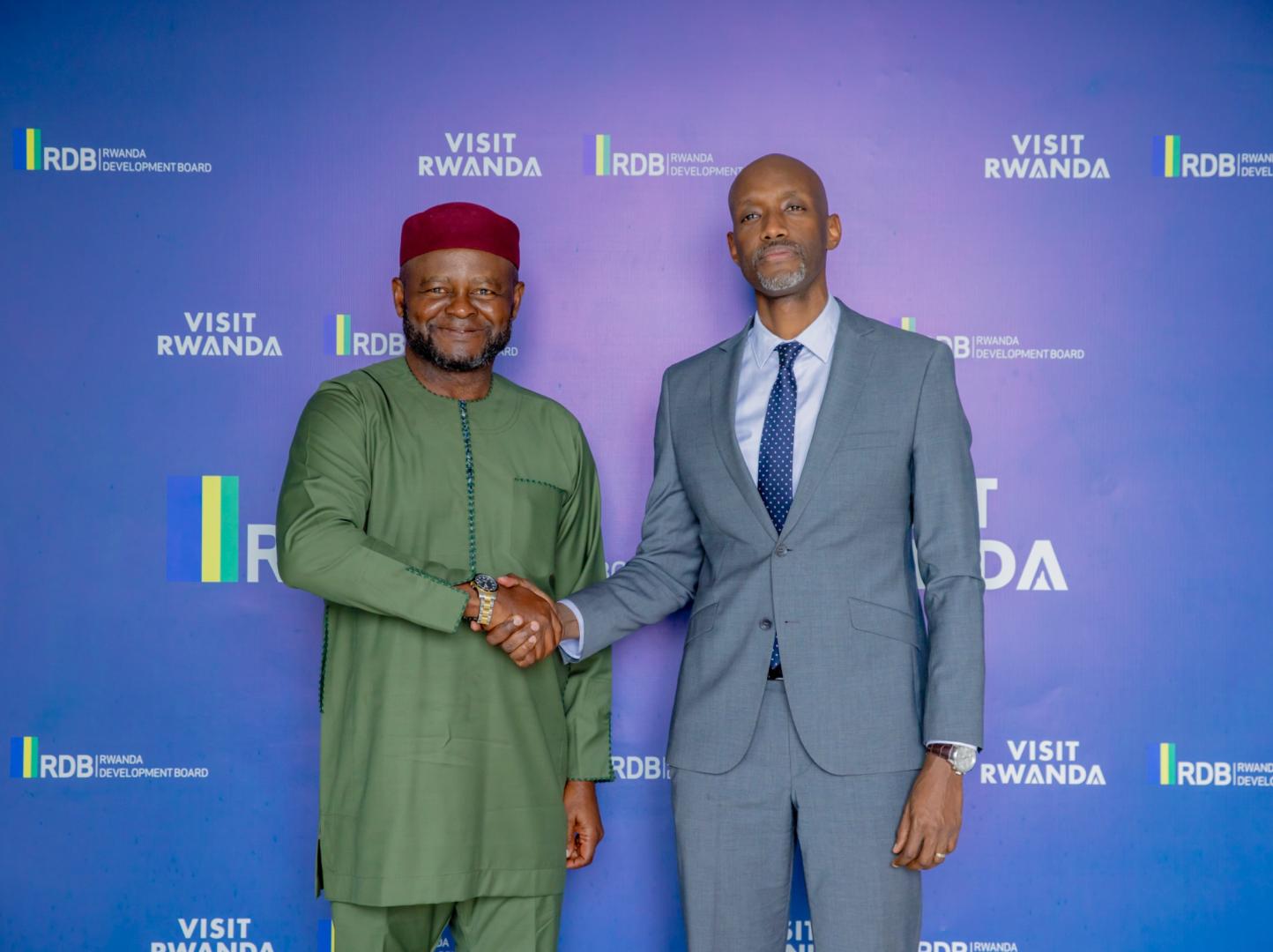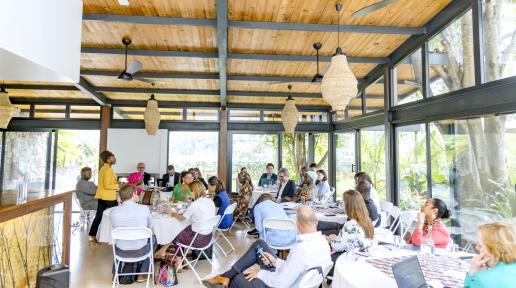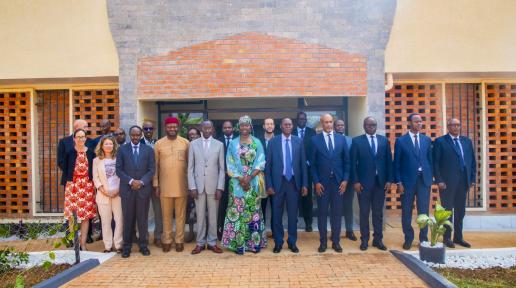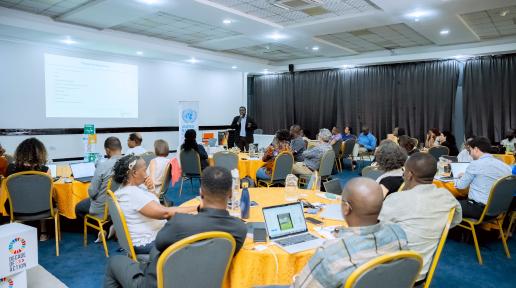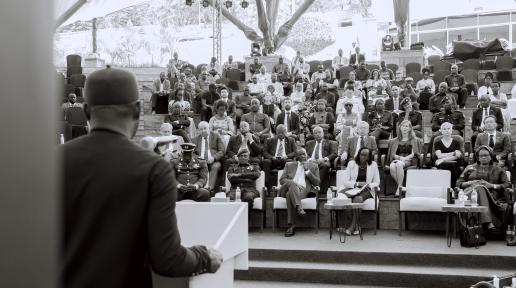Story
21 July 2025
UN and Rwanda Development Board Deepen Strategic Partnership to Unlock Private Capital and Accelerate SDG Investment in Creative Industries, Sports and Affordable Housing
In a high-level meeting that underscored Rwanda’s ambition to shape a resilient and inclusive future, UN Resident Coordinator Mr. Ozonnia Ojielo and the Chief Executive Officer of the Rwanda Development Board (RDB) Mr. Jean-Guy K. Afrika -- explored a set of transformative pathways aimed at reshaping how Rwanda finances and fuels its national development. From shifting the country's development financing model to unlocking the creative sector’s potential and building real solutions for affordable housing, the conversation marked a significant moment in Rwanda’s journey toward inclusive, sustainable, and innovation-driven development.Transitioning from Aid Dependency to Private Capital MobilizationAs global aid patterns evolve and concessional financing becomes increasingly constrained, the meeting strategised on how Rwanda can proactively attract private capital and blended finance to sustain momentum on its development priorities and reduce reliance on traditional aid flows.Ozonnia and Afrika highlighted the growing urgency for Rwanda to transition from traditional donor-funded models to private sector-driven investment frameworks. With foreign private capital inflows increasing by 33.8% in 2023, reaching USD 886.9 million—of which foreign direct investment accounted for over 80%—Rwanda is clearly headed in the right direction (NISR, 2024). Yet, the reduction in concessional grace periods and the tightening of development finance calls for a more proactive stance. “Private capital is the engine of the future—we need to double or even triple its share of GDP. The current financial pressures are, in fact, prompting us to be more innovative and strategic in how we mobilize private capital to support national development goals.” said Jean-Guy K. Afrika, Chief Executive Officer of the Rwanda Development Board (RDB)They explored strategies for designing bankable, investment-ready projects, coupled with risk mitigation tools and regulatory incentives to ensure Rwanda remains a top destination for sustainable investment. The UN pledged its continued support in partnering with Rwanda to make this transition smoothly, through capacity building, technical assistance, and global convening power.“We have started implementing our new Cooperation Framework, which is very different from what we had in the past. In the previous framework, we had six outcomes and 25 outputs, which meant we could be everywhere and try to do everything, but that approach was not sustainable. The new Cooperation Framework focuses on just three outcomes, fully aligned with the National Strategy for Transformation, and six outputs. We want to be more coordinated in how we deliver our collective offer and leverage our comparative advantage,” said Ozonnia Ojielo, UN Resident Coordinator.Building a Sustainable Business Model for Sports and EntertainmentAnother key area of discussion was the development of a sustainable business model for Rwanda’s sports and entertainment sector. Ozonnia emphasised the need to move beyond one-off events and toward the creation of an institutionalised calendar of recurring high-profile competitions and festivals that would position Rwanda as a regional hub for sports tourism and creative culture. “Flyfest is a festival that takes place every year in Lagos and across West Africa,” said Ozonnia. “We could leverage the existing partnership with its organisers to bring it to Kigali every December. It has the potential to create multiple streams of income for Rwanda and open up new opportunities for Rwandan artists.”Rwanda’s recent record backs this ambition: the events and MICE (Meetings, Incentives, Conferences, and Exhibitions) industry generated USD 95 million in 2023, a 48% increase from 2022, hosting over 160 events and welcoming more than 65,000 delegates (Rwanda Convention Bureau, 2024). The country’s investment in sports infrastructure, including the newly renovated Amahoro Stadium and the BK Arena, further strengthens its competitive edge. With strategic planning and partnership, both leaders agreed that sports and entertainment could serve as powerful engines for youth employment, tourism, and cultural branding.“Indeed, this sector holds immense potential—not just for growth, but for long-term transformation. What we're striving for is a fundamental shift in mindset: moving away from reactive, short-term investment approaches to a more strategic, forward-looking model. We're intentionally identifying high-impact areas, anticipating future trends, and positioning Rwanda as a hub where innovation, sustainability, and inclusive development drive investment decisions," noted Afrika.A Vision for Rwanda’s Creative EconomyThe meeting also explored the vast potential of Rwanda’s creative sector, an area increasingly recognised as a driver of inclusive growth. Drawing from his experience and insights from Nigeria, Ozonnia shared the evolution of Nollywood, which began with modest resources and is now valued at over USD 6.4 billion, contributing nearly 2.3% to Nigeria’s GDP (UNCTAD, 2021). He stressed that Rwanda has all the ingredients to emulate a similar trajectory: a young, tech-savvy population, political will, and a growing reputation as a clean and safe destination for international creatives. The ongoing partnership between the United Nations, the Ministry of Youth and Arts, and RDB aims to build a holistic ecosystem for film, music, animation, and digital arts. This includes investment in training, production facilities, export platforms, and intellectual property protection—laying the groundwork for Rwanda to become a continental leader in cultural entrepreneurship.“I remember in my early days as a young lawyer representing Nigerians who were selling VHS tapes—copying Chinese and Indian movies. But look at Nollywood now. It’s impressive, and something similar is absolutely possible here in Rwanda,” noted Ozonnia.Finding Scalable Solutions for Affordable HousingAs Kigali and other urban centers continue to grow rapidly—amid projections that 35% of Rwanda’s population will reside in cities by 2030—both Mr. Ozonnia Ojielo and Mr. Jeanine Afrika underscored the strategic importance of expanding access to affordable housing as a key pillar of inclusive and sustainable urban development. They emphasized the pivotal role of public-private partnerships in unlocking scalable, sustainable housing solutions and advancing SDG 11: Sustainable Cities and Communities, ensuring that urbanization in Rwanda is inclusive, resilient, and future-ready..With annual demand for affordable housing estimated at 25,000 units, but supply falling drastically short—only a few thousand units built in the last decade—the gap remains a formidable development challenge (UN-Habitat, 2024). Ozonnia proposed leveraging the technical expertise of UN-Habitat to design innovative models that combine private investment with affordability and sustainability. These include mixed-income developments, community-led housing cooperatives, and smart public-private financing tools to unlock capital for large-scale urban housing. The leaders underscored the need to build not just homes, but livable communities with access to jobs, transport, and essential services.“UN-Habitat has conducted a thorough analysis of models that could work for affordable housing in Rwanda, and presented an excellent proposal focused on using locally available and manufactured building materials. This approach could significantly reduce construction costs for low-income earners. One example is the use of earth-made bricks,” added Ozonnia.Charting a Bold Future Through a Shared VisionThis strategic dialogue served as a platform to explore not only the opportunities Rwanda can harness on its development pathway, but also the forward-looking partnerships and global cooperation that are helping the country respond proactively to emerging challenges. It reaffirmed Rwanda’s commitment to transition from aid dependency to innovation-driven growth, from event-based visibility to industry-led transformation, and from policy formulation to people-centered delivery.The partnership between the United Nations and RDB continues to evolve—as a collaborative platform for unlocking new models of sustainable and inclusive development—anchored in national priorities and aligned with global goals. As Rwanda pushes forward with its Vision 2050 agenda—to become an upper-middle-income country by 2035—this dialogue underscored the importance of multidimensional, cross-sectoral partnerships that will deliver results not just in numbers, but with meaningful and transformative impact in the lives of Rwandans.
